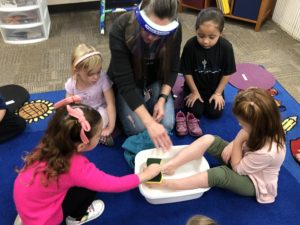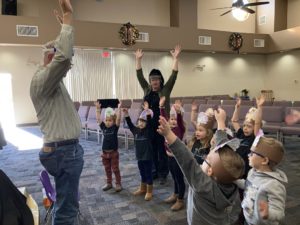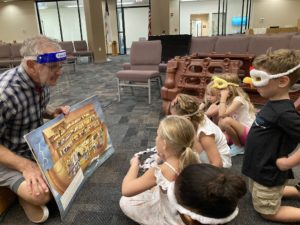CHILD-CENTERED, DISCOVERY BASED CURRICULUM
Curriculum should be meaningful
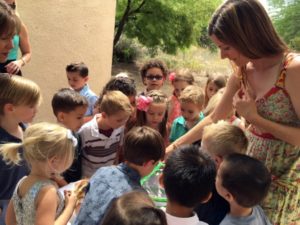 God’s Garden utilizes a child-centered, discovery based curriculum with projects, themes, or topics that are integrated in all learning activities. A child-centered environment inspires children to learn by giving them the steering wheel to their educational path. It makes learning meaningful. These activities are also developmentally appropriate and offer children an opportunity to work independently. Students learn to direct their fascinations, ask questions, and work on their own as well as part of a group.
God’s Garden utilizes a child-centered, discovery based curriculum with projects, themes, or topics that are integrated in all learning activities. A child-centered environment inspires children to learn by giving them the steering wheel to their educational path. It makes learning meaningful. These activities are also developmentally appropriate and offer children an opportunity to work independently. Students learn to direct their fascinations, ask questions, and work on their own as well as part of a group.
Our Goals
- Demonstrate God’s love for each child, their families, and all creation.
- Encourage independence, foster growth of healthy self-concept, and develop a sense of responsibility.
- Encourage development of empathy, cooperation, honesty, respect and altruism.
- Promote receptive and expressive language skills and encourage emergent literacy.
- Stimulate curiosity about the world.
- Promote investigation, decision-making, cooperation, and persistence.
- Promote critical thinking, problem solving, emotional regulation, and conflict resolution through critical conversations with others.
- Encourage children to dig deeper by teaching them to engage in the following: making judgments, evaluating, comparing, contrasting, critiquing, explaining, and examining.
- Strengthen motor skills and increase awareness of health and safety.
- Support growing abilities to communicate ideas through the visual arts, drama, construction, music and movement.
- Enhance imagination, spontaneity, and originality.
- Inspire lifelong love of learning and love of God.
- Provide a firm educational foundation in preparation for kindergarten and beyond.
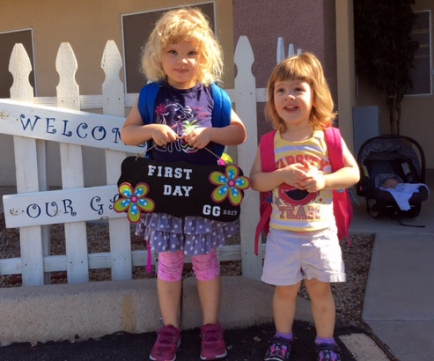
HIGH/SCOPE
Engage in ``Key Experiences``
Our Program incorporates the High/Scope Preschool educational approach, which focuses on active learning through play. High/Scope provides an “open framework”, and teachers can adapt activities to the special needs and conditions of their class. The central tenet of the High/Scope approach is “active learning” – the belief that children learn best through active experiences with people, materials, events, and ideas rather than through direct teaching or sequenced exercises.
Adult-child interaction is an integral component of the High/Scope Curriculum.In the High/Scope curriculum, children and adults share control and teachers follow the children’s interests.Children learn best when pursuing their own interests and goals, therefore, students are encouraged to make choices about materials and activities for much of the day. Within this environment, they explore and discover, ask and answer questions, solve problems, and interact with classmates and adults.
As a natural outcome, they engage in “Key Experiences” (High/Scope Educational Research Foundation). These key experiences are grouped into the following 10 categories and provide the basis for the God’s Garden preschool skill objectives and assessment:
- Creative Representation
- Language, Literacy & Reasoning
- Initiative and Social Relations
- Movement
- Music
- Classification
- Seriation
- Number
- Space
- Time
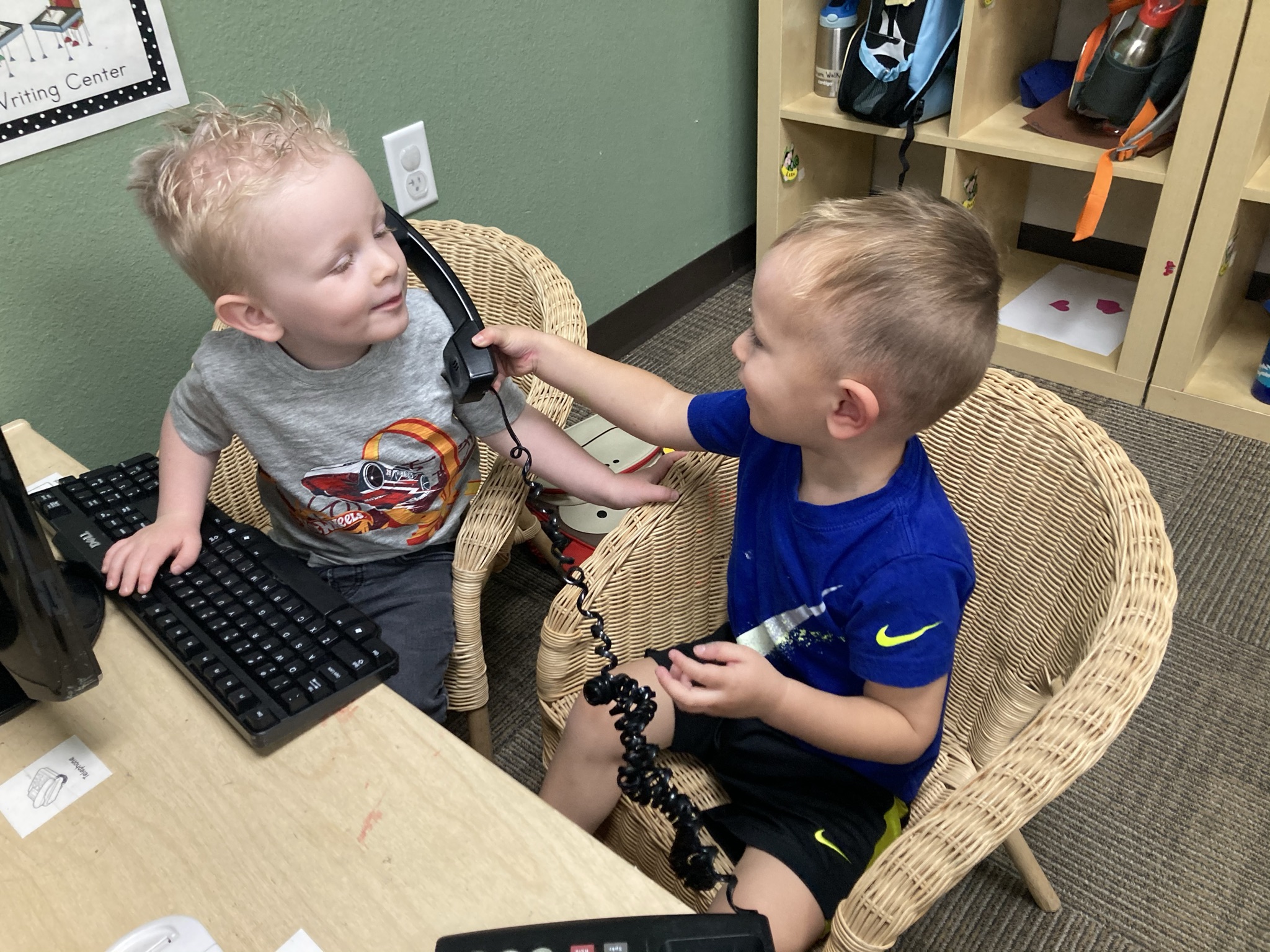
CURRICULUM
Best Services for Kids
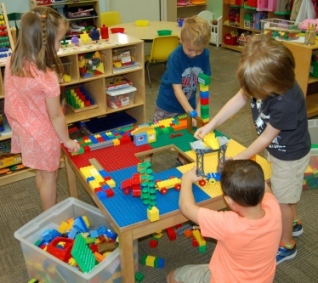
The space and materials at God’s Garden are carefully selected and organized to promote active learning.Supplies are frequently rotated and are arranged to allow for independent access and clean-up.The classrooms are divided into the following activity-specific core learning centers:
- Fine Motor/Puzzles
- Art
- Music/Movement
- Blocks/Toys
- Sensory Table
- Dramatic Play
- Nature/Science
- Math
- Writing
- Reading
CHRISTIAN EDUCATION
Chapel, prayer, and lessons from the Bible
Christian Education is integrated into the secular themes being studied by each class. Monthly Chapel with the Pastor and Christian Education in the classroom are used to supplement and reinforce the curriculum and campus-wide themes. Examples of these themes include: Prayer, Kindness, Love, Joy, The Birth of Jesus, The Easter Story, and God’s Unconditional Love.
KINDERGARTEN READINESS
Giving them a head start
All families want their children to be successful in school. At God’s Garden, we prepare children for kindergarten and beyond. We teach children basic academic skills including – letters, numbers, shapes, and colors. We also teach them to follow rules, make good choices, solve conflicts, and to be respectful.
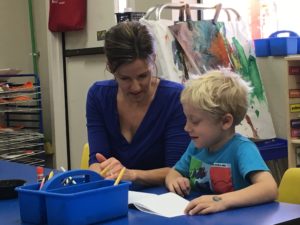 At God’s Garden, children are provided with opportunities to develop social and emotional competence – which is at the root of kindergarten readiness. Without these skills, children won’t be able to navigate through the demands of school. Children learn emotional regulation, self esteem, and self confidence by building relationships with other children and adults at God’s Garden. They also learn resiliency, self-control, empathy, cooperation, taking turns, conflict resolution, problem-solving, and making friends.
At God’s Garden, children are provided with opportunities to develop social and emotional competence – which is at the root of kindergarten readiness. Without these skills, children won’t be able to navigate through the demands of school. Children learn emotional regulation, self esteem, and self confidence by building relationships with other children and adults at God’s Garden. They also learn resiliency, self-control, empathy, cooperation, taking turns, conflict resolution, problem-solving, and making friends.
Kindergarten students who are more inclined to exhibit “social competence” traits—such sharing, cooperating, or helping other kids—are more likely to attain higher education and well-paying jobs. This is supported by a 20-year retrospective study funded by the Robert Wood Johnson Foundation and published in the July 2015 issue of the American Journal of Public Health. Click Here to read the article in full.
Kindergarten Readiness also means that children are prepared to engage in higher order thinking. Higher Order Thinking involves the learning of complex judgmental skills such as critical thinking, problem solving, emotional regulation, and conflict resolution. It is beyond rote memorization and regurgitation of information.
Higher order thinking includes understanding facts, inferring from them, connecting them to other facts and concepts, categorizing them, manipulating them, putting them together in new ways, and applying them as we seek solutions to new problems. This also includes abstract concepts, schemas or mental representations, visualization, inferences, idea generation, insights, creativity, and analytical intelligence (i.e., making judgments, evaluating, comparing, contrasting, critiquing, explaining, and examining, etc.). These concepts are difficult to learn and to teach, but they are easier to learn if children are exposed to these concepts at early ages.
At God’s Garden, teachers engage children in conversations that promote higher order thinking. These conversations are integral in helping children learn to create innovative ideas and concepts that are necessary for success in school and beyond. They occur during episodes of free-choice play, small groups, large groups, circle time, and outdoor play. They begin at age 2 and continue until they complete Pre-K and move on to kindergarten.
Click Here to learn more about how to promote higher order thinking skills from “Reading Rockets”.
WHAT CAN PARENTS DO TO PREPARE CHILDREN FOR KINDERGARTEN?
Being actively involved in your child’s learning is directly related to your child’s success in school. So what can you do to prepare your child for school?
- Be your child’s first teacher
- Encourage your child to explore
- Give your child time to process information
- Engage with your child
- Encourage your child to express himself
- Encourage your child to find solutions on his/her own
- Provide lots of opportunities for play
- Talk to your child(ren) and often
- Ask lots of questions
- Sing to your child(ren)
- Read to your child(ren) and do it often
- Set and follow a consistent routine – children thrive on structure
- Build a meaningful relationship with your child
- Provide opportunities for responsibility
- Help your child work through tantrums
- Model problem solving as much as possible
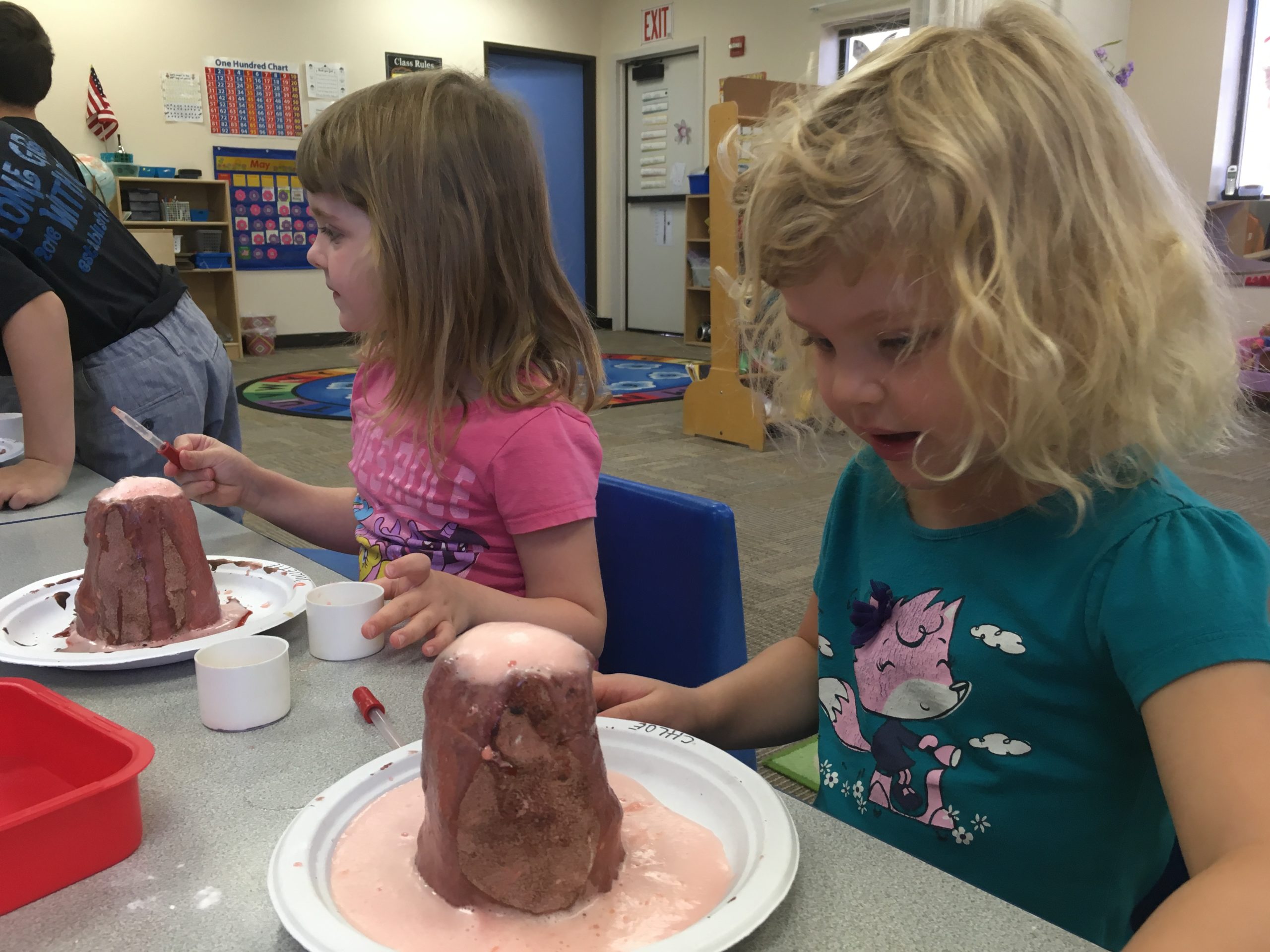
Social Emotional Intelligence is key!
Social emotional development refers to the ability to develop close and secure relationships with others, to experience, regulate, and express emotions in socially and culturally appropriate ways, to communicate effectively with others, and to develop the confidence to explore the environment and learn.
At God’s Garden, social and emotional development is of the utmost importance. Healthy social and emotional development creates
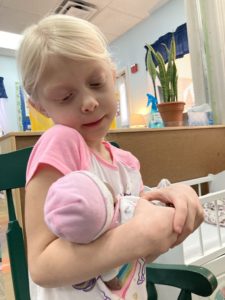
a strong foundation for success in school and beyond. Children with strong social and emotional skills at early ages are more likely to get a college degree, obtain and hold a job, and have fewer problems with the police than children who do not have strong social and emotional skills.
Research demonstrates that of those children who are not successful in school, many have social-emotional difficulties (i.e., aggression, bullying, substance abuse, obesity, violence, etc.) that prevent them from achieving school success. A focus on social and emotional development during the early years can prevent these difficulties later in life. Positive social-emotional growth builds the communication skills necessary for learning throughout a child’s life.
Some social-emotional skills that support school readiness are: emotional vocabulary and intelligence, self-regulation, self-control, sharing, negotiation, intentionality, attention, cooperation, collaboration, communication, social awareness, taking-turns, empathy, coping, helping others, persistence, concentration, confidence, conflict resolution, problem solving, self-esteem, motivation, curiosity, negotiation, resiliency, responsibility, and leadership.
At God’s Garden, our teachers provide children with a foundation in positive social and emotional development by teaching children to build and maintain healthy relationships, to communicate needs and with others, to develop emotional intelligence (ability to identify emotions and to use emotions to guide thinking and actions), and to develop the ability to engage in the regulation of emotions, which is known as self-regulation. Teachers help children recognize, understand, and label emotions through the use of books, signs, conversations, and direct experiences. The more words we give children to describe emotions the better; this will allow children to pinpoint emotions more accurately, to communicate more effectively, and to identify appropriate regulation strategies.
Teachers model expressing their own emotions and share personal stories so children can see it firsthand. This provides children with different strategies to express their own emotions. Teachers also help children learn to self-calm by co-regulating their emotions. Soothing touch and the sound of soft voices are cues that help children learn to develop self-calming skills. As children get older, they begin to use self-regulation skills without prompting or assistance.
Children are provided with opportunities to interact with others, including teachers and peers, in a variety of activities (free-choice play, large group, small group centers, outdoor play, snack time, etc.). Children develop confidence, curiosity, and cooperativeness by interacting with other children and adults. They also learn problem-solving, conflict resolution, collaboration, concentration, negotiation, intentionality, persistence, attention, self-control, communication, and leadership by interacting with other children. Social-emotional skills help children persist on challenging tasks, seek help when they need it, and be thoughtful in their actions. These skills are directly related to a child’s readiness for kindergarten and beyond and set the stage for learning academically.
Teachers make connections with children in their classrooms. When connections are made, children learn that that are safe and can trust you and others. Teachers work to build strong, trusting relationships by getting to know each child. They will ask children to bring in pictures, toys, and favorite objects from home to share with the class. They engage in show-n-tell, star student, and secret reader, all of which, promote a link between the home and the school community.
Teachers create a School Family. The culture of a school can foster bullying, blame and cliques, or it can build cooperation, willingness and responsibility. The School Family builds connections between families and schools, teachers and teachers, teachers and students, and students and students to ensure the optimal development of all. The School Family creates a fundamental shift in education and classroom management. Leave coercion, fear and external rewards behind, and step into a world where intrinsic motivation, helpfulness, problem-solving and connection govern your classroom.
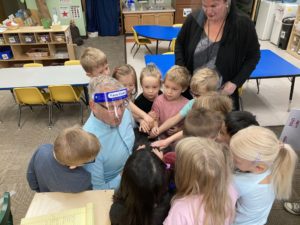
The focus is on relationships instead of societal roles. The School Family is created through routines, rituals and structures. Don’t be surprised if your child comes home singing the Wish you Well song, the Good Morning song, or Goodbye song. These songs help your child feel connected to the children and teachers in their classroom and build cooperation, partnership, and belonging. Children thrive when they belong and feel cared about.
Teachers model empathy. Empathy helps children learn to organize themselves, cope with disappointment, and get their emotions under control. When adults empathize with a child, he/she realizes that they care about their ideas and feelings. This validates the child and helps him or
her recognize and accept his or her feelings, which is necessary for resolving them. Acceptance of emotions teaches children that an emotional life is not dangerous or shameful, but instead manageable.
Teachers set consistent routines, rituals, and transitions in the classroom to create a sense of stability and security. Children don’t have control over much other than sleeping, eating, and using the potty. Using consistent routines helps children learn to trust adults and anticipate what is coming next. Our teachers use verbal, visual, and auditory cues to help children learn routines. They set expectations early on in the school year by teaching children about the centers in our classrooms and how to use them. They also use warnings and prompts. Songs, bells, whistles, job boards, picture schedules, first-then boards, cue cards, turn-taking cards, reminder charts, feeling charts, and timers are all used to help children learn to anticipate and follow routines. Keeping consistent routines at home will help children learn to build trusting relationships with parents. It also helps children feel well rested and ready for learning.
Teachers offer 2 positive choices – a choice between two predetermined events or objects (i.e., you can clean up the blocks or trains). It takes away the option for a child to say “no” and helps a child comply with an adult’s wishes. Offering choices builds self-esteem and willpower. It also helps children develop a sense of autonomy, assert themselves, and feel empowered.
Each classroom has a Calm Down Area or Safe Space to help children work through strong emotions. The Calm Down Area, also known as a SAFE SPACE, is a place in the classroom where the children can go when they are upset, want to be alone, or have a problem. The calm down area is located in a cozy, small spot of the classroom, like a corner. It includes something soft to sit or lay on (i.e., mat, couch, bean bag, etc.), a variety of soft materials (i.e., stuffed animals & pillows), posters and pictures of emotions, problem solving posters (breathing exercises), books about dealing with emotions, 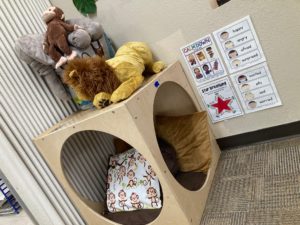
and calm down tools (sensory bottles, mirrors, bubbles, balls, playdough, etc). It may also include stress balls, puppets, tents, tissues, lotion, plants, etc. It is a space to deal with strong emotions, calm down, engage in emotional regulation, and feel safe and understood. It is a place where children can go to safely experience emotional upset or distress. It teaches children to safely deal with strong emotions through active calming – breathing, talking through it, soothing, etc. It is NOT to be used as a form of TIME OUT. Time out is a form of punishment, which is rooted in using external force to govern behavior. The motivation behind a Calm Down Area is to encourage children to make good choices, empathize with others, and develop internal control.
Social emotional development is crucial to the developing child. Healthy social emotional development leads to success in kindergarten and beyond. Children who experience healthy social emotional development in the first five years of life are more likely to adapt to school and form successful relationships throughout life. Furthermore, these children are more likely to graduate from high school, attain higher education, and obtain and hold well paying jobs than children with inadequate social emotional development. This is supported by a 20-year retrospective study funded by the Robert Wood Johnson Foundation and published in the July 2015 issue of the American Journal of Public Health. At God’s Garden preschool it is our goal to ensure that every child is provided with opportunities to develop social and emotional competence, and thus enter kindergarten ready to learn.
